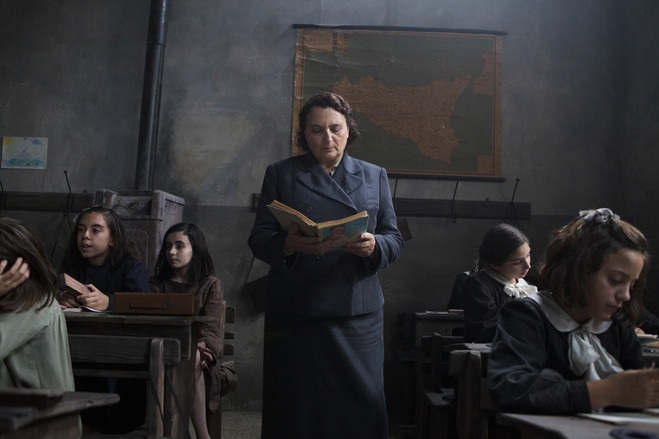This opening episode of My Brilliant Friend was a stunning symphony in grey. For any viewers concerned that HBO’s long-awaited Elena Ferrante adaptation might be tempted to sweeten the visual experience of the writer’s impoverished 1950s Naples world to suit the expectations of an international television audience, the sheer subtlety of colouring here was the first sign that everything was going to be right.
Director Saverio Costanzo will be receiving a whole range of plaudits for his work with the wide ensemble cast (including many non-professionals) that surrounds his two remarkable young protagonists – Elena (Elisa Del Genio), or Lenù as we come to know her, and Lila (Ludovica Nasti) – but it’s surely the production’s design (from Giancarlo Basili) and the cinematography (Fabio Cianchetti) that ensures that the environment they inhabit seems so convincing. It was remarkable just how beautiful each extra hue, a dab of mustard here, a touch of olive there, added to the screen’s otherwise spare palette could look: not a jot of embellishment to the atmosphere that Ferrante’s novels evoke so persuasively.
The dramas unfolding from these balconies were memorable
My Brilliant Friend is a story that builds out incrementally from its core, gradually revealing layers of a wider world. (Perhaps that was why the opening framing device, with Elena in age being prompted by Lila’s disappearance to embark on telling their story, for all its neat explication of the dynamic of their relationship, felt somehow extraneous.) It’s part of the sheer magic experience of following a childhood story: as the girls explore their world, so do we. It gradually expanded from the classroom, down the town’s small streets with their few shops and a bar – each place loaded with particular family allegiances – and onto that small square that is the nexus of the community's life.
The dramas unfolding from these balconies were memorable, what with the departure of the Sarratore family into the wider world, pursued on their way by Melina’s fury (her pots and pans, too). But quite what that wider world comprises remains something of a mystery: the train line runs through town, and traffic roars past, breaking up the stone-throwing with which Lila so gamely engages. But where does it all go? It’s such a self-contained environment so far, no hint that a metropolis like Naples may be in the vicinity. First we discovered the secrets of the immediate locality, like the mysterious cellar that swallows up the girls’ dolls, then the wasteland that borders town; only in the third episode will we see anything beyond, as their brave attempt to reach the sea is defeated by huge expanses of plain that appear to lead nowhere. The way to get out of this world, Ferrante already makes clear, is through learning, through the opportunities that education, so crucial a theme in these first episodes, can offer. That’s not just the cleverness of reading and writing, though Lila’s precocious abilities in those fields are almost uncanny, and knowledge confers status, as the schoolroom competition between the girls and boys showed so beguilingly. Their teacher, Maestra Oliviero (Dora Romana, pictured above), is a massive presence in more ways than one, her intervention capable of altering fate in an environment where every pair of working hands, no matter how young, helps to bring food to the family table. And beyond any such academic qualifications, of course, is the way in which books in the widest sense offer absorption in other worlds, and the chance in turn to create them: no wonder that Don Achille’s unexpected generosity will be converted into a copy of Little Women.
The way to get out of this world, Ferrante already makes clear, is through learning, through the opportunities that education, so crucial a theme in these first episodes, can offer. That’s not just the cleverness of reading and writing, though Lila’s precocious abilities in those fields are almost uncanny, and knowledge confers status, as the schoolroom competition between the girls and boys showed so beguilingly. Their teacher, Maestra Oliviero (Dora Romana, pictured above), is a massive presence in more ways than one, her intervention capable of altering fate in an environment where every pair of working hands, no matter how young, helps to bring food to the family table. And beyond any such academic qualifications, of course, is the way in which books in the widest sense offer absorption in other worlds, and the chance in turn to create them: no wonder that Don Achille’s unexpected generosity will be converted into a copy of Little Women.
The scene in which the girls braved themselves to climb the stairs to confront this almost ogre-like figure caught the dynamics between the two of them just beautifully, the contrast between the dark, mysterious impetuosity of Lila and the fairer, more restrained hesitancy of Lenù. Elisa Del Genio and Ludovica Nasti are so natural in their roles that it’s hard to believe that they will be growing so quickly, and that their world, so lovingly established here, will itself change dramatically. But change it will, and we barely needed a rather insistent score from Max Richter to remind us of that. It seemed the only element that felt more driven than organic: on the evidence so far, My Brilliant Friend promises huge delight ahead.















Add comment